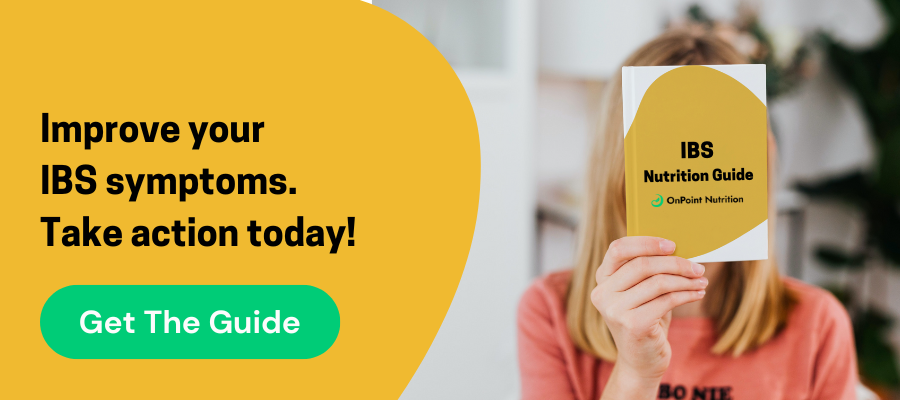
So you've tried the medicines. You've sampled various over-the-counter supplements. "Changed" your diet. Yet nothing seems to work. Although the scientific community's understanding of IBS has improved over recent years, avoiding its triggers and relieving its symptoms can be a challenge. Because each person's IBS is unique, we work with clients to identify person-specific factors. Currently, there is a guideline consensus that diet and lifestyle advice should be the first-line approach in the dietary management of IBS. Below learn how you can use nutrition therapy techniques to relieve your IBS
Diet History Can Uncover Clues to Your IBS
In order to identify exactly what foods may trigger your IBS, we always start by taking a detailed diet and symptom history. This enables you to isolate your food intolerance and your body's specific responses.
Keep a detailed food log: for seven days, record exactly what you eat any GI sympoms that you experience after eating. Include the severity of your symptoms. Our food and symptoms logs include fields to record:
- Time you eat: helps to identify whether certain environmental factors trigger your IBS symptoms
- Food/supplement ingested: certain foods may trigger your IBS symptoms. Check out our full list here
- Amount of food you ate: yes, even the amount of food you eat can cause IBS symptoms.
- Activities completed while you ate: try not to multi-task. Distracted eating can interfere with proper digestion
- GI symptoms during the day. Perhaps its not 100% your food, but other issues that are leading to your symptoms
We use the ADA’s Nutrition Care Manual as a guide. This document suggests that patients with IBS receive a complete nutritional assessment that includes:
- A food history: as mentioned above, this helps your dietitian determine whether specific foods are triggering your IBS symptoms
- Anthropometrics: most popular in children's studies, doctors will use body measurements to identify potential nutrition deficiencies
- Biochemical and clinical parameters: your doctor can test for biochemical abnormalities in your blood and fluids that can cause abdominal discomfort, unusual poop, and bloating
- Issues such as swallowing problems: these can uncover a relationship between the esophagus, stomach, and intestine. It also encourages your dietitian to investigate acid reflux or GERD.
- Nausea, vomiting, constipation, diarrhea, heartburn: yep, are you getting the normal IBS symptoms? You can read more here
- Food allergies and intolerances: well yes, this is straightforward. If you have known food allergies, they may trigger IBS symptoms.
- Cultural food practices: as much as we all may love certain ethnic foods (Indian, Thai, Vietnamese, you name it), if your body is not used to unusual spices, you could end up triggering IBS symptoms
- And alternative therapies in the assessment
What about Elimination Diets for IBS?
After you document your symptoms, you will begin to form ideas (or, scientifically, hypotheses) about what foods trigger your IBS. We can specifically identify these trigger items by eliminating foods one-by-one.
These elimination diets often uncover that the following foods trigger IBS:
- fried foods
- dried beans
- caffeine
- carbonated beverages and alcohol
- cabbage family foods
- sugar alcohols
- fructose and lactose
Our clients log how many of these foods they eat regularly and whether avoiding these foods alleviates their IBS symptoms.
We recommend following a systematic exclusion diet for four weeks. So what foods should you exclude in the initial elimination phase? They must meet two criteria
- Those foods that you identified as "problem areas" from your food logs, OR
- Foods that research has identified as potential contributors to symptoms in an already disordered digestive tract
As the symptoms improve, begin to reintroduce foods one at a time to determine their effect. If your body can handle the food, you can add it back for good!
FODMAPS
Although a niche specialty, we also help clients determine the role FODMAPS (fermentable oligosaccharides, disaccharides, and monosaccharides and polyols) play in IBS symptoms.
FODMAPS carbohydrates, including lactose, fructose, sugar alcohols, fructans, and galactans, cause IBS symptoms because they are both fermentable and osmotically active. Basically, this means that the food is hard to absorb and serves as food for bacteria in your GI tract. During the elimination phase, you should only eat foods that contain little or no FODMAPS carbohydrates.
Next, challenge yourself in a systematic way with each other type of carbohydrate and record your symptoms.
Few, if any, foods must be eliminated from the diet permanently, as many tips and techniques are available to manage symptoms caused by each class of carbohydrates.
Conclusion: Work back to Normal Eating
Perhaps the most difficult task dietitians face is helping patients with IBS find their way to healthy, balanced eating. After years of self-elimination, frustration, and debilitating symptoms, this may be easier said than done. Try your best to normalize your eating pattern.
If you are not eating certain food groups, you may not be getting adequate nutrients. By gradually and successfully adding foods back into the diet, one can come closer to a healthful, stress-free eating pattern.
To read more about foods to avoid, foods to eat, and how to make easy changes to your IBS diet to mitigate your symptoms, download our IBS Nutrition Guide.
Topics

Britney Kennedy is the founder and CEO of OnPoint Nutrition. Since opening in 2016, she and her team have helped over 2,500 individuals become happier, healthier more confident versions of themselves.




